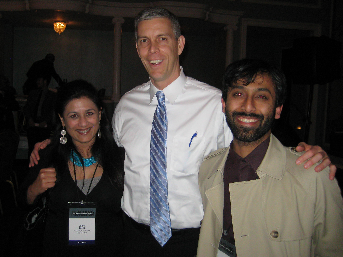By Sujata Bhatt
For three days last week, I ditched my fifth grade, high-poverty, English Language Learner, Los Angeles Unified School District classroom of 23 boys and 11 girls. No, I didn't run out of the classroom screaming because I couldn't take it anymore; I love my school and my class, even though -- or, actually, because -- they offer me complex and satisfying challenges every day.
But I left them behind and flew to New York, where I'd been invited as a Teach Plus Teaching Policy Fellow to attend the 2nd International Summit on the Teaching Profession. I was glad to be there. And I was hoping my three days away from my fifth graders would make no difference at all.

Why would I hope for that?
Here's the simple answer: it's March 20.
If, two thirds of the way into the school year, I can't leave my class in the hands of a good substitute without my students' relationships to learning falling apart, I'm not doing my job well enough. If, by now, I haven't nurtured a culture of responsibility and problem-solving that doesn't rely solely on my leadership and decisions, I need to rethink what I'm doing. My job title, after all, is teacher, not dictator.
A full third of the Summit's agenda was devoted to the issue of leadership, including discussion of the damage caused by autocratic rule of the type so prevalent in the US education system. When leaders are unwilling to share decision-making processes, 'the led' don't buy into the organization's mission. The system devolves into conflicts and stalemates between prescriptive, controlling bosses and door-closing, foot-dragging employees. And the organization's mission -- in this case, to educate children -- falls apart.
Many of us, from Norwegian union leaders to Icelandic education secretaries to American and Singaporean teachers and professors, agreed that collaborative leadership is one path out of this conflict.
Collaboration means that leadership is not the work of one head but rather many heads; it's a group activity where people come together to define missions, set goals, and problem-solve along the way to those goals. And participant after participant at the Summit asserted that teachers need to be included in that group activity.
I flew back from New York heartened to hear so many powerful figures finally recognizing that teacher leadership was vital in changing education systems. And I was excited to bring specific ideas, insights, and examples back to my school.
Smiling, I opened the office door. A mish-mash of papers cascaded from my usually empty mailbox. Instantly, I knew something was very wrong.
I scanned pages detailing conflict: the substitute's allegations of airborne pencils, students' vaguely apologetic 600-word(!) essays assigned as punishments, parental rebellions against the overload of punishments, the principal's note on school police being brought in. Suddenly, our classroom culture of learning, responsibility, and problem-solving seemed very far away. And the utopia of collaborative education reform, well...
This time, I really wanted to ditch.
But I took some deep yoga breaths. I did not slam my students as failures. I did not publicly humiliate them. Instead, we discussed issues and aired grievances using our existing structures of class governance. A few kids took responsibility for acting up a little, and then more did. Others owned up to socializing more than they ought to have, three confessed to having launched a few pencils to test the sub, and we problem-solved to plan how to proceed should this or similar situations arrive again.
We concluded by looking beyond the drama at the past week's learning tasks: 32 out of 34 in the class had read the text on Shackleton's expedition, finished their Google contest drawings, and submitted their water cycle projects. Most impressively, they had met the week's math goal: they had completed 10,997 math problems in an online math contest in order to move their rank up from 13th to 9th in the nation in their age group. These students had known what to do. Without me.
The mission -- educate! -- had been preserved. I released those yoga breaths. I was proud of them, and I made sure to tell them that.
As education reformers and decision-makers proceed to change the system, they need to bring in teacher experts and even student experts. They need to share leadership with those of us who are in schools on a daily basis. We often know what to do because we do it daily.
Ben Levin, Research Chair in Education Leadership and Policy at the University of Toronto, wisely reminded us of this at the Summit. "Leadership is a group activity," he said. "It is happening all the time in our schools ... We just need to look more broadly to find it."
Sujata Bhatt is a National Board Certified teacher at Grand View Boulevard Elementary in Los Angeles, where she currently teaches fifth grade. She is a Teach Plus Teaching Policy Fellow.